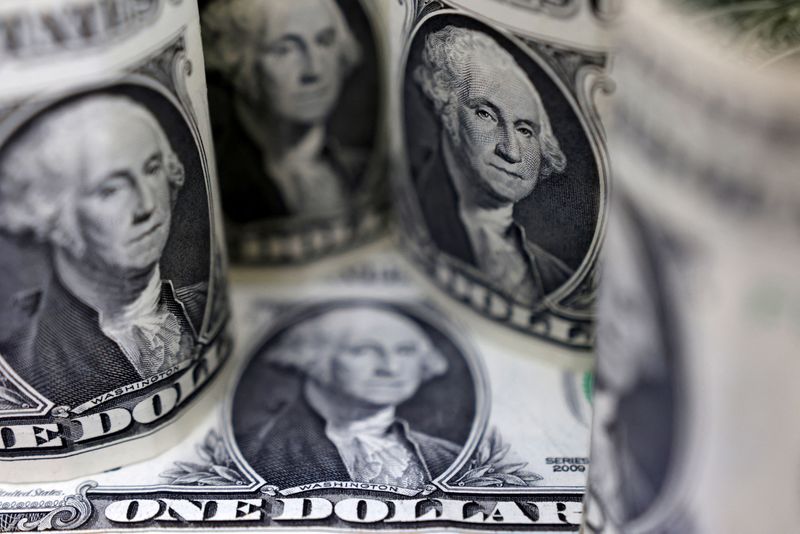By Paritosh Bansal
(Reuters) -The United States is happily chipping away at the pillars that support the dollar as the world’s reserve currency, with the latest blows coming from some powerful Americans who are questioning the rule of law following the conviction of Donald Trump.
By doing so, the country is essentially challenging the rest of the world to find an alternative – and so far the country appears to be winning.
The attacks on the justice system in the wake of former President Trump’s conviction follow other steps seen by some as the United States throwing down the gauntlet to the rest of the world.
The country has radically increased the use of sanctions as a punitive foreign policy tool. And it creates a huge amount of debt, leaving unhappy foreigners who seek the safety and depth of the markets to finance the excesses.
Over the past three weeks, I’ve asked financial services executives, global investors and other experts in Asia and the United States how long they think Americans can hold out without a significant backlash. Several sources requested anonymity to speak candidly about the situation.
These conversations showed that there is growing consternation, both at home and abroad, about the consequences of American hubris. But despite attempts, no one has yet managed to find a credible alternative or expects one to emerge anytime soon, and that’s partly their own fault.
In Asia, for example, people are increasingly asking themselves what their “America plus 1” is as they look for ways to reduce their exposure to the US and boost non-dollar trade flows.
But efforts to build such systems have been slow or not yet successful. And rising authoritarianism, threats to individual and property rights, and geopolitical tensions have meant that even if U.S. assets are less attractive than before, other options are worse.
For example, a recent survey shows that central bank reserve managers plan to increase their dollar holdings over the next 12 to 24 months as rising global geopolitical tensions and the need for liquidity draw them to the currency.
“Ironically, the strength of the U.S. dollar is partly due to its virtually unchallenged safe-haven status,” said Steve H. Hanke, a professor of applied economics at Johns Hopkins University who served on former President Ronald’s Board of Directors Reagan. Economic advisors. “That said, most investors don’t understand the geopolitics and the dangers lurking beneath the surface until it’s too late.”
THE DOMINANCE OF THE DOLLAR
At its core, the dollar’s dominant role in the world stems from the democratic principles of the United States. The country is underpinned by the sheer size of its economy, the depth of its markets and the strength of its institutions and the rule of law.
The belief in democracy runs deep. Last week I asked Gary Gensler, chairman of the U.S. Securities and Exchange Commission, who has been in government since 1997, whether party politics had made the job of officials like him more difficult. A conservative-leaning US appeals court had rejected one of his signature initiatives that morning.
“I believe in this constitutional system that we have. It’s messy,” Gensler said. “It’s democracy.”
Nevertheless, this messiness challenges some of the foundations of the dollar’s global appeal.
Attacks on the US justice system have increased following Trump’s verdict in a New York court. Florida Governor Ron DeSantis, for example, called it a “kangaroo court” on the social media platform
A major investor from Asia said the potential threats to US institutions are also worrying. Any challenge to the Federal Reserve’s authority – as Trump allies are reportedly considering – would damage the dollar’s credibility, the investor said, adding that such a development could trigger a double-digit depreciation of the currency.
Trump’s campaign for his Republican presidential bid has downplayed such reports about what conservative groups might be planning.
STRUGGLE OF SANCTIONS
A senior New York-based financial services professional who has been traveling in Asia said he is hearing from clients who think U.S. and Western financial policies are “undermining the dollar and the Western financial system more broadly.”
He pointed to a “growing thicket of sanctions” as one reason.
And the West is pushing the boundaries further. The chief financial officer said discussion that the West could seize about $300 billion in Russian government bonds blocked over Ukraine undermined the United States’ safe-haven status. “The West has crossed a Rubicon there,” the director said.
A Treasury Department review of sanctions in October 2021 found that such designations had risen to 9,421 by that year, from 912 in 2000. It noted at the time that “US adversaries – and some allies – are already reducing their use of the dollar.”
An Asia-based investor said he was closely watching another lawsuit to test the strength of the rule of law: ByteDance’s challenge to a U.S. ban on TikTok. He is waiting for evidence the US government would provide to support the claim that the app poses a threat to national security.

If no evidence is publicly offered, there would be a “feeling that the checks and balances, the independence of the justice system, may not be there – at least in this case,” the investor said.
But then he added that even that may not keep him from the United States. It’s still more independent and better than a lot of other places, he said.


